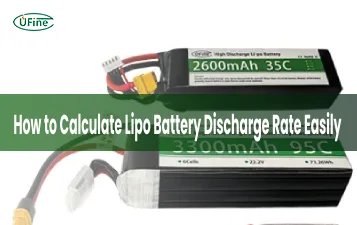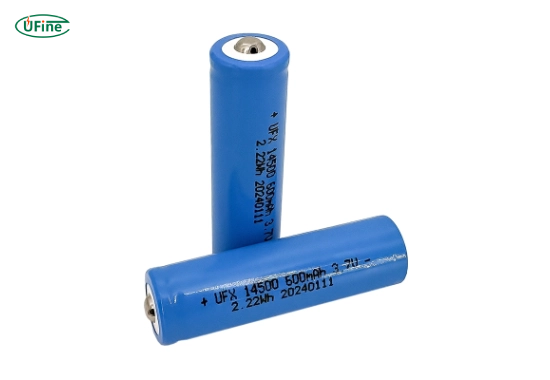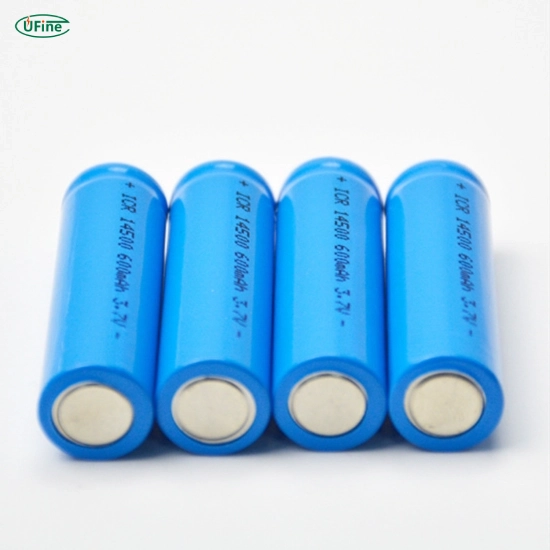Thanks to its compact size and reliable performance, the 14500 battery has been a staple among portable electronic devices for years. However, recent speculation in the tech and manufacturing industries has raised concerns about whether companies will phase out these batteries in 2024. Are these rumors true, or is it just misinformation? In this article, we’ll explore the current state of 14500 batteries, their future, and what it means for consumers and manufacturers alike.
Part 1. What is a 14500 battery?
A 14500 battery is a rechargeable lithium-ion battery often used in flashlights, power tools, and small electronics. Its name comes from its dimensions: 14mm in diameter and 50mm in length. Unlike traditional AA batteries, the 14500 battery operates at a higher voltage, typically around 3.7 volts, compared to 1.5 volts in standard alkaline batteries.
Users prize the 14500 battery for its high energy density, long lifespan, and ability to deliver consistent power. It’s also lightweight, making it an excellent choice for portable devices. However, with advancements in battery technology and changing consumer preferences, some question whether these batteries will still be relevant in the coming years.
Everything You Need to Know About the 14500 Lithium Battery
Part 2. Why is there speculation about 14500 batteries going away?
Several factors have fueled rumors that manufacturers might discontinue 14500 batteries in 2024. Here are the key reasons driving this speculation:
- Emergence of newer battery technologies: With the rise of more advanced batteries like lithium-polymer and solid-state batteries, some manufacturers are phasing out older models in favor of cutting-edge alternatives.
- Environmental regulations: Governments worldwide are tightening environmental policies, targeting the production and disposal of lithium-ion batteries due to concerns about e-waste and resource depletion.
- Shifts in consumer demand: As consumer electronics evolve, manufacturers increasingly design devices to accommodate integrated or proprietary batteries rather than replaceable ones like the 14500.
- Market trends: Some manufacturers have announced plans to scale back production of certain battery models, fueling rumors about the discontinuation of the 14500.
While these factors seem compelling, they don’t necessarily spell the end for 14500 batteries. Let’s explore the arguments in more detail.
Part 3. Are 14500 batteries being discontinued in 2024?
No, manufacturers have not officially decided to discontinue 14500 batteries in 2024. While rumors and industry speculation exist, no significant manufacturers have confirmed plans to stop producing these batteries. Instead, the market for 14500 batteries remains steady, catering to niche applications and specific devices.
It’s important to note that while newer technologies are emerging, the 14500 battery still plays a critical role in many industries. For example, flashlights and compact tools often rely on 14500 batteries for their high energy output and small size. Until manufacturers widely adopt an alternative, there’s little chance these batteries will disappear entirely.
Part 4. How are 14500 batteries used today?
The 14500 battery continues to be a popular choice for a wide range of applications. Here’s a look at the most common uses for them:
- Flashlights: Many high-performance LED flashlights use 14500 batteries because they provide brighter and longer-lasting illumination than alkaline AA batteries.
- Small electronics: Devices like laser pointers, portable fans, and handheld radios often rely on 14500 batteries due to their compact size and reliable power.
- Power tools: Some lightweight power tools use 14500 batteries, especially in applications with critical portability and weight.
- DIY projects: Hobbyists and makers frequently use 14500 batteries in custom electronics projects, thanks to their rechargeable nature and compatibility with joint battery holders.
- Emergency backup power: The high energy density of 14500 batteries makes them an excellent choice for emergency kits and backup power supplies.
Part 5. Are there better alternatives to 14500 batteries?
While the 14500 battery remains a solid option for specific applications, some alternatives may be better suited for certain use cases. Here are a few options:
- Lithium-polymer batteries: These batteries are thinner, lighter, and more flexible in terms of shape, making them ideal for slim or irregularly shaped devices.
- 18650 batteries: With a larger size and higher capacity, 18650 batteries power laptops, electric vehicles, and high-powered flashlights.
- NiMH rechargeable batteries: Nickel-metal hydride (NiMH) batteries offer a lower-voltage rechargeable alternative to 14500 batteries for devices that work with AA batteries.
- Integrated batteries: Many modern devices now have built-in rechargeable batteries, eliminating the need for replacement batteries.
While these alternatives have advantages, they don’t fully replace the 14500 battery in size-to-performance ratio and versatility.
Comparative Analysis: 14500 Battery Vs. 18650 Battery
Part 6. What are the environmental implications of 14500 batteries?
Like all lithium-ion batteries, the 14500 battery has environmental impacts to consider. The production and disposal of these batteries contribute to resource depletion, greenhouse gas emissions, and electronic waste. However, there are efforts to mitigate these effects:
- Recycling programs: Many countries have established battery recycling initiatives to recover valuable materials like lithium and cobalt from used batteries.
- Improved manufacturing processes: Advances in battery production are reducing the environmental footprint of lithium-ion batteries.
- Consumer education: Encouraging consumers to recycle batteries responsibly can significantly reduce the environmental impact of 14500 batteries.
Part 7. Are manufacturers still producing 14500 batteries?
Yes, manufacturers are still producing 14500 batteries, although the number of suppliers has decreased recently. Leading brands like Panasonic, Samsung, and Nitecore continue to offer high-quality 14500 batteries, ensuring they remain available for consumers.
However, some smaller manufacturers have shifted focus to other battery types, reflecting broader industry trends. This has led to a slight reduction in the availability of 14500 batteries, which are still relevant.
Part 8. Can newer battery technologies replace the 14500 battery?
While newer battery technologies like solid-state batteries and lithium-polymer cells show promise, they have yet to be widely available or cost-effective enough to replace the 14500 battery fully. Researchers and manufacturers primarily develop these newer technologies for high-end applications like electric vehicles and advanced consumer electronics.
The 14500 battery remains a practical and affordable choice for many devices. As technology evolves, we may see gradual adoption of alternatives, but a complete replacement is unlikely shortly.
Part 9. How can consumers adapt to potential changes in the battery market?
If you rely on 14500 batteries, there are steps you can take to prepare for potential changes in the market:
- Stock up on quality batteries: Purchase from reputable brands to ensure you have a reliable supply.
- Invest in a good charger: A high-quality charger can extend the lifespan of your 14500 batteries, reducing the need for replacements.
- Explore alternative power sources: Research other battery types or devices that may meet your needs if 14500 batteries become less available.
- Stay informed: Follow industry news and announcements from battery manufacturers to stay ahead of potential market shifts.
Part 10. FAQs
-
Are 14500 batteries being discontinued in 2024?
No, there is no official confirmation that manufacturers are discontinuing 14500 batteries in 2024. While industry rumors persist, manufacturers continue to produce these batteries. -
What makes 14500 batteries different from AA batteries?
14500 batteries are rechargeable lithium-ion batteries with a higher voltage (3.7V) than standard AA batteries (1.5V). They are only directly interchangeable if your device supports the higher voltage. -
Can I use a 14500 battery in any device that uses AA batteries?
No, you should only use 14500 batteries in devices specifically designed to handle their higher voltage. Using them in incompatible devices may cause damage. -
Are there alternatives to 14500 batteries?
Alternatives include lithium-polymer batteries, 18650 batteries, and NiMH rechargeable batteries. Each option has pros and cons. -
How can I recycle 14500 batteries?
You can recycle 14500 batteries at designated battery recycling centers or through programs offered by electronics retailers. Always follow local guidelines for battery disposal.
Related Tags:
More Articles

LiPo Battery Discharge Rate Guide & Calculation Tips
Understand LiPo battery discharge rates, C-ratings, and how to calculate max current. Essential guide for RC, drones, and electronics users.
High‑Capacity 3S LiPo Batteries: 5000 mAh vs. 10000 mAh
Compare 3S LiPo 5000mAh vs 10000mAh batteries by weight, power, and use. Find the best fit for your drone, RC car, or boat setup.
Top 5 Applications for Small 3S LiPo Batteries
Small 3S LiPo batteries power drones, RC gear, wearables, and robotics with high energy and low weight. Making them ideal for compact electronics projects.
Building and Charging Your Own 3S LiPo Pack: A Step‑by‑Step Guide
Learn how to build, balance, and charge a 3S LiPo battery pack safely at home with this complete DIY guide for hobbyists and beginners.
How to Choose the Right LiPo Battery Plug Type?
Discover the best LiPo battery plug types, how to choose them, and expert tips for safe usage, soldering, and maintenance.





